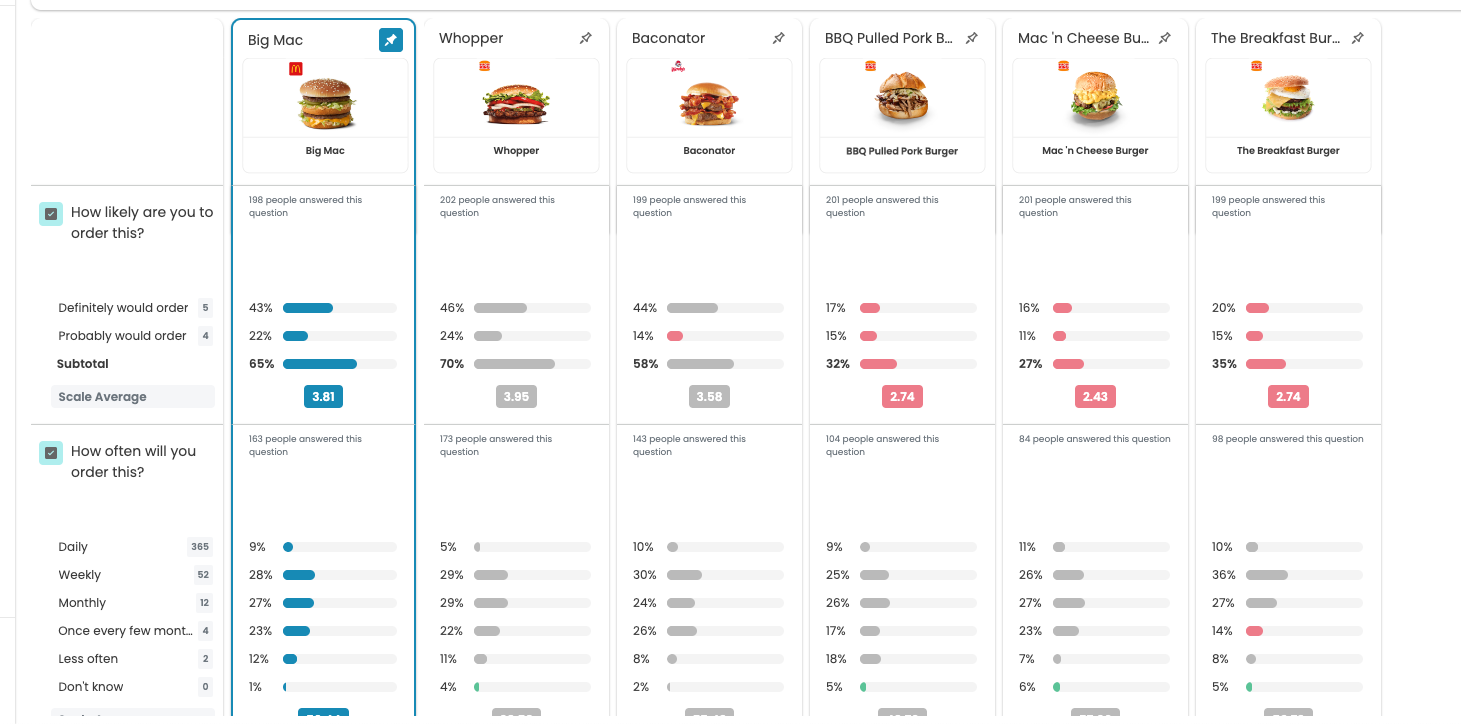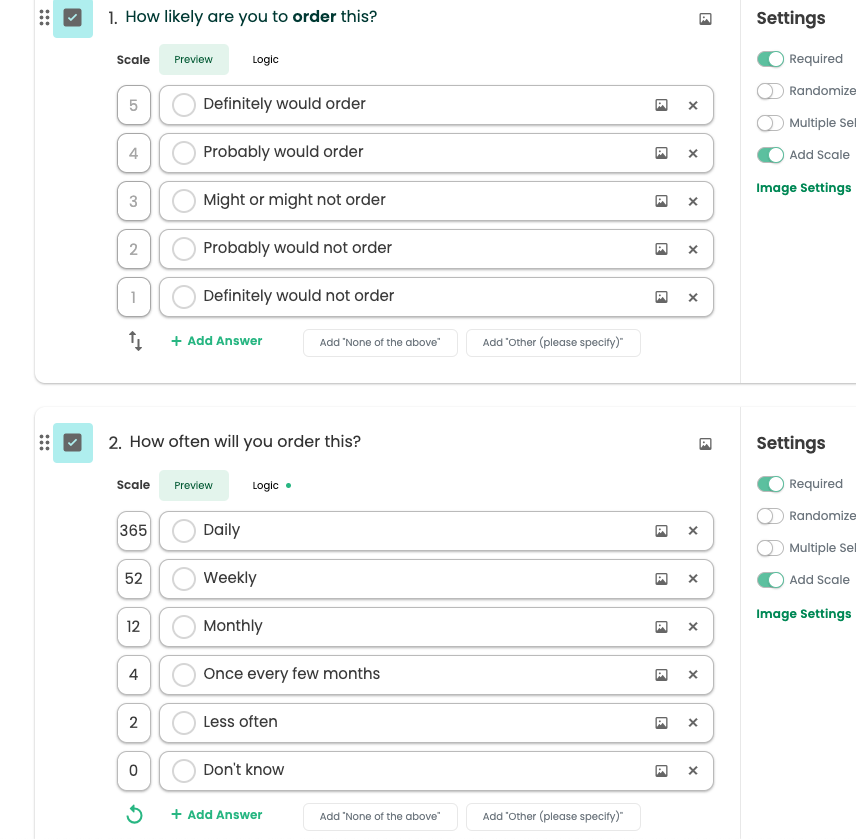
Introducing Rank Question
Add a Rank Question to your next survey
This question type requires respondents to rank the different answer options. As usual, we have done it with a mobile first approach. Respondents can select the answers based on their preferences and even re-order them, by clicking or dragging them.
A few things to know:
- You can have respondents rank all answers or select a specific count of responses for them to rank. That could be "Rank your top 3" as an example. In any case, respondents will never be asked to rank more than 10 answers, that would just not be a fun survey.
- In report mode, you will have the average rank for all answers calculated automatically and will see the distribution of all ranks for the different answers. In a convenient way, you will be able to show only certain ranks and see the cumulative percentage of respondents that have ranked those answers in these ranks.

Introducing SPSS Export
Download as SPSS
This will download all study data in multiple SAV files, one for each section, and packaged into a .zip folder.
- You will have different different files for each section and they further break down into files for question answers, Idea info, Interest scores & Commitment scores depending on what sections you have in your study.
- Idea Split files will be stacked data -you'll have multiple rows for the same respondent ID, equivalent to the number of ideas a respondent saw in the Idea Split

You can use these exported data files as inputs for advanced analytical tools.

Introducing Scale Averages
Averages provide a single-number summary of response on a single-response scaled question. Averages is our version of 'mean scores' in research-speak.
Introducing Averages into Upsiide means that you can now more quickly distill complex data into a single number. This allows you to understand the data more quickly and/or convert the data into something more meaningful quickly.
Here you can see Averages in the context of our Idea Split module:

In order to turn Averages 'on' for your single-select scale questions, simply toggle 'Add Scale' (within Settings) in the question builder.

The introduction of Mean Scores into the platform means that you can now run a different type of stat-testing (t-tests) which often requires smaller sample sizes to find significant differences.

Introducing Documents
- Documents shared by the Dig Insights & Upsiide team can now be viewed from directly within your study.

Introducing: Heatmaps 🔥
The Heatmap question type allows respondents to answer a question by engaging with the idea the user is testing. Respondents can click in to tap on specific elements of the idea and provide verbatim feedback.
A few things you need to know:
1. You can use Heatmap in both Splits and Questions sections
When using Heatmap in a question section, you'll need to upload an image to test. But when you're using Heatmap in Splits you can upload the idea card as normal. There are even options for selecting which elements of the idea card are to be shown in the question (image only or image with text).

2. It's all customizable
If you want respondents to have the option of appending comments and feedback to the ideas you're testing, you can make Heatmap functionality optional. You can also customize the number of clicks and comments each respondent can add.

3. Dedicated reporting makes insight generation easy
Your study has closed and you're ready to understand how each idea performed. The Heatmap reporting visualizes where people engaged (clicked/tapped) with the ideas tested. Respondents' comments are shown as verbatim and in a word cloud to help identify common feedback.

If you want a walkthrough of the Heatmap functionality, we'd be happy to help! Please reach out to your Customer Success Manager OR log into the platform and connect with our Support team.

The new Audience experience is live!
There is no *completed* study without the right respondents. We've spent the last few months re-working our Audience feature, streamlining the process of building and sending out a study. And now it's here!
Here's what you can expect the next time you launch:
1. It's now easier than ever to set up an Audience for a multi-language study
Let's imagine you've got a study that needs to go out to a bunch of different people from a bunch of different places (that all speak different languages, naturally). Previously, you would have added multiple audience groups to a study and applied screening questions to each of the groups. With the new Audience experience, you can select your screening questions ONCE and apply to all of your demographic groups. Or, you can choose to apply the screening questions to a select subset of those demographic groups.

2. Brand new Audience templates and screening question libraries
Let's say you need to reach an audience you've surveyed before; now, we've got heaps of Audience templates and pre-built screening questions to choose from, all of which have been translated into the different languages Upsiide supports. Need to survey primary grocery shoppers in a brand new geography, or quickly add a screening question to an audience? You're just a couple clicks away.

3. Improved quota settings
We've improved our interlocking quotas feature, making it easier to select which quotas you'd like to interlock. But we're nerd-ing out most on our new feature that allows you to set quotas on your own custom screening questions.

4. Simplified Audience pricing
We've consolidated our pricing options into 3 tiers based on country. This will allow for faster completion times and subsequent decision-making. For all of the info, click below.
The new Audience Experience may look and feel different, but we're here to help you on your journey to mastering it. Our Customer Experience team is offering each client hands-on training to get comfortable!
If you'd like to take advantage of their knowledge, reach out to your Customer Success Manager OR log into the platform and connect with our Support team.

Introducing: AI Idea Generation
Hi !
We know there's a benefit to integrating AI into our day-to-day, but adapting your routine and ensuring you're leveraging AI in a responsible way can be challenging. Especially when you're trying to push projects out the door!
With our newest feature - an AI Idea Generator - you can leverage AI from within the platform (making it seamless) and ensure you're use of AI is entirely ethical. This feature is designed to be a brainstorm buddy, helping you generate new AI ideas when running an idea screen.
Now, when inputting new text-based ideas into Upsiide, you can ask our AI engine to generate some more. Once the AI engine has come up with a host of new ideas based on your prompt, you can edit or customize them. And then with one click, your ideas get added individually to the idea screen.
Check out our how-to video to see how it works!

Upsiide app improvements 🎉
“If it ain’t broke don’t fix it” is not a phrase we live by at Dig Insights.
When we built Upsiide, we wanted to reinvent the respondent experience to make it as engaging and effective as possible. A few years on, we know how successful this change has been. But much like with any tech product, stagnation is the enemy. We took some time, did research-on-research to test hypotheses, and looked at the latest user behavior research. This resulted in a couple of small but mighty aspects of the app experience.
Here’s a quick walkthrough of our most noteworthy improvements:
Re-ordered Commitment Experience
This release moves commitment (trade-off) screens to appear at the end of the idea screen instead of after each “like” or right swipe. Now, respondents will swipe/like all ideas up-front and then trade-off on all ideas sequentially. We’ve done research and A/B tested both experiences extensively. The two experiences are highly correlated (greater than 0.9 R-Squared correlation).
This does not change how Idea Screen questionnaires are created or how you should analyze the results post-survey. The key benefits of this re-ordered experience are an improved experience for respondents and and an increasingly stabilized Idea Score across and within studies.
Question Layout Changes
We’ve updated the layout for a couple of our question types, Idea Split, Single and Multi-Select, and Grid questions. Nothing has changed from a question creation standpoint, but it’s even more intuitive for respondents to answer these questions.
All In-App Gestures Modernized
Mobile and app behaviors continue to evolve and our app experience now reflects them. You’ll notice swipe up, tap and, more modern mobile behaviors reflected in our refreshed respondent experience.
Any questions about the above? Feel free to get in touch with your Customer Success Manager.
Chat soon,
The Upsiide Team

Lights.. camera.. swiping! 🎥
Introducing videos - any videos - to the list of what you can now test on Upsiide.
Talk about screening, prioritizing & optimizing videos at its finest 👌
